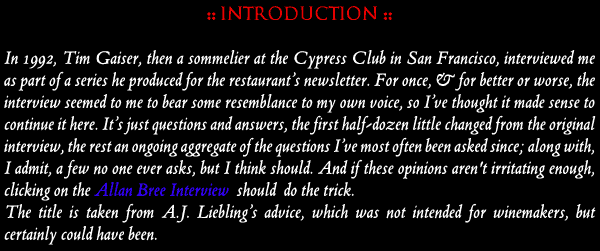



|
Q
:: How did you get into winemaking? |
|
Q :: Did you have any formal training? A :: In art history. Q :: But no degree in wine-making? A
::
Well,
so far as I know, no such academic degree is offered, by any institution,
anywhere in the world. If this seems as incomprehensible as the fact
that there's no word for "wine-maker" in French, so it is;
but it's also equally true. |
|
Q :: So, no enology degree from UC Davis? A
::
No; pretty clearly not. Despite my genuine respect for the tools
enological training has given the wine-maker, they are just that: tools,
not the craft itself. And even if UC Davis - or anyone else - actually
did teach wine-making, which obviously I wish they did, I don't know
if I could learn it that way myself. |
|
Q :: But you're not saying that science isn't useful in wine-making, are you? A
:: I'm not saying anything of the sort! I'm saying
that no matter what the intensity of my love for my microscope or for
malolactic chromatography, science simply is not the essence of the
process, and to believe that it is, is a fatal error. When science is
useful, it can be acquired, used as a tool should be used, and kept
in its proper place. |
|
Q
:: Is that why there are so many mediocre wines, and
so many wines that taste alike? |
|
Q :: How would you describe the market for your own wines? A
::
Someone
once asked me why they should buy my wines, when there are so many others
out there; I replied that there are many people out there, too, but
only a few are friends. They aren't interchangeable, and I like the
thought that my wines would be prized in the same way - for offering
pleasures uniquely their own. Of course this means my wines will have
an equally individual audience, for that very same reason; after all,
while they may be my friends, they won't be everybody's. |
|
Q :: But, do you think that's a good approach to wine in general? A
:: Absolutely, unequivocally, yes, I do. I think the experience
of a new wine should be approached as openly as the experience of a
new person, and I'm very strongly arguing for openness in both cases.
|
![]()
![]()